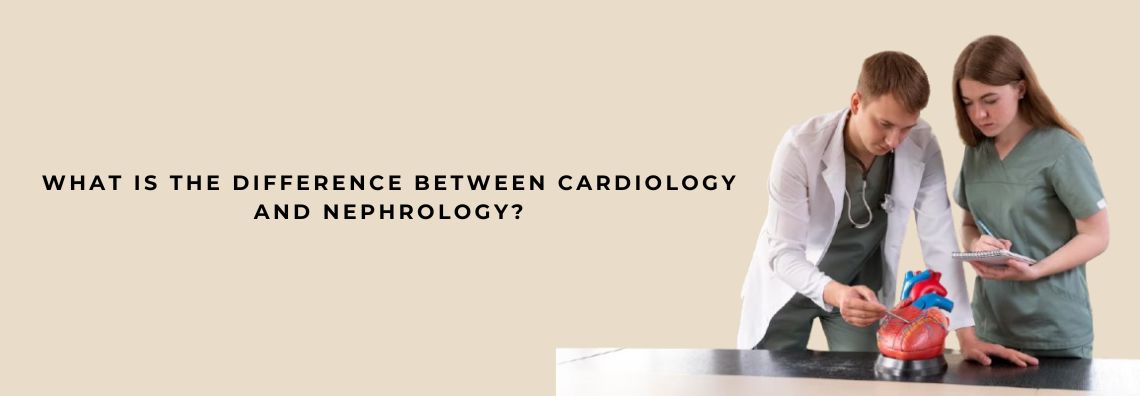
In the field of healthcare, there are several specialties. Two very important specialties, cardiology and nephrology, focus on two essential organs of the body: the heart and kidneys. Although both specialties diagnose, treat and manage chronic diseases, there is a distinguishable difference in the focus, the conditions treated, the procedures done, and the specific training that specialists undergo.
This article will look at the key differences between cardiology and nephrology, as well as how to tell what each specialty entails and when you should consider visiting a cardiologist or nephrologist.
What Is Cardiology?
Cardiology is the medical specialty that focuses on the heart and the veins and arteries that comprise the cardiovascular system. A cardiologist is a physician who has special training and experience in diagnosing and treating diseases related to the heart and the circulatory system.
Cardiologists treat a variety of conditions that relate to the heart including:
- Coronary artery disease (CAD)
- Hypertension (high blood pressure)
- Congestive heart failure
- Arrhythmias (irregular heartbeat)
- Valvular heart disease
- Cardiomyopathy (disease of the heart muscle)
- Congenital heart defect
- Heart attacks (myocardial infarction)
Cardiologists also practice preventive cardiology, which focuses on helping patients prevent heart disease by addressing risk factors like obesity, smoking, diabetes, and hyperlipidemia.
Cardiac Diagnostic and Treatment Procedures:
To diagnose and treat heart disease, cardiologists have a number of tools and procedures available to them:
- Electrocardiogram (ECG or EKG): an electrical tracing of the heart’s activity.
- Echocardiogram: the ultrasound of the heart to look at both the structure and function of the heart.
- Stress testing: monitors the heart’s performance during exertion/exercise.
- Cardiac catheterization: a minimally invasive procedure to look into the coronary arteries and see if there is any blockage..
- Holter monitoring: 24-hour ECG monitor to assess irregular rhythms.
Depending on the condition, treatment could include medications, lifestyle adjustments, interventional procedures (angioplasty), or surgery (such as, bypass surgery performed by a cardiothoracic surgeon).
What is Nephrology?
Nephrology is the field of medicine that deals with the kidneys (how they work and diseases that affect them). A nephrologist is a physician who diagnoses and treats kidney disease.
Nephrologists treat or manage diseases and complications that can impact kidney function, such as:
- Chronic kidney disease (CKD)
- Acute kidney injury (AKI)
- Glomerulonephritis
- Nephrotic syndrome
- Polycystic kidney disease (PKD)
- Kidney stones (with urologists)
- Electrolyte imbalances (such as sodium or potassium)
- End stage renal disease (ESRD) and dialysis
- Kidney complications related to hypertension or diabetes
Nephrologists also help manage systemic conditions, provided the patient’s kidneys are not damaged or being damaged by the systemic processes, as the kidneys help regulate blood pressure and fluid balance.
Diagnostic and Therapeutic Resources within Nephrology:
Nephrologists have a number of tools to diagnose kidney disease:
- Blood and urine test to determine kidney function (e.g. creatinine, GFR).
- Imaging studies – ultrasound or CT scan of the kidneys.
- Kidney biopsy – the definitive procedure for diagnosing some forms of kidney disease.
Treatment may include:
- Control of blood pressure and blood sugars.
- Diet (low sodium, low protein, etc.)
- Medication to decrease protein loss or slow progression.
- Dialysis (either hemodialysis or peritoneal dialysis).
- Preparation for kidney transplant or without transplant (as needed).
Training and Education
Cardiologists and nephrologists are both well-trained medical doctors, but their paths diverge after completing medical school.
Cardiologist Training
- 4-year medical degree
- 3-year residency in internal medicine
- Enter a 3-year cardiology fellowship
- Sometimes pursue additional fellowship training in subspecialties like interventional cardiology, electrophysiology, or heart failure.
Nephrologist Training
- 4-year medical degree
- 3-year residency in internal medicine
- Enter a 2-year nephrology fellowship
- Sometimes pursue additional training in transplant nephrology or interventional nephrology.
When is it necessary to refer patients to a cardiologist versus a nephrologist?
You may need to refer a patient to a cardiologist if they present with:
- Pressure or pain in the chest
- Shortness of breath brought on by exertion
- Irregular heartbeat or palpitations
- A history of stroke or heart attack
- Elevated cholesterol or family history of heart disease
You may need to refer a patient to a nephrologist if they present with:
- Persistently elevated creatinine or abnormal kidney function tests
- Blood or protein detected in urine
- Difficult to control elevated blood pressure
- Swelling in the legs or unexplained fatigue (possibly due to fluid retention)
- A diagnosis of chronic kidney disease or need for dialysis
Conclusion
Cardiology and nephrology are unique yet complementary medical specialties. Cardiology limits its scope to the heart and blood vessels and helps manage diseases related to the heart such as heart disease/hypertension and arrhythmias, among others. Nephrology is the medical specialty which cares for kidneys and addresses any associated issues and disorders, such as kidney failure, electrolyte imbalances, and other issues.
Both specialties essentially belong to a category of specialists that manage patients with chronic disease, and both specialties rely upon the evaluations and testing to help manage chronic disease. Both specialties allow patients to access a holistic management plan. Understanding the roles within specialty medicine will help patients navigate their needs and obtain the right specialist when it is time. Nephrologist chermside can help patients to find the root causes of their problems.